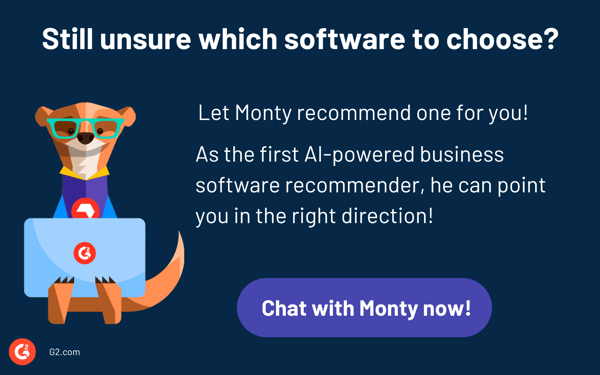Software program replace pop-ups at all times appear to seem on the worst doable time. I’ve misplaced depend of how typically a safety replace or compelled restart has derailed my workflow. If one replace can disrupt me, how do IT groups deal with hundreds with out chaos?IT groups know that unpatched vulnerabilities are an open door for attackers. Firewalls and antivirus assist, however with out correct patching, every thing else is simply injury management. That’s the place one of the best patch administration software program is available in. It retains programs up to date with out downtime, safety gaps, or compliance dangers.
However with so many shifting elements, discovering the proper answer is not at all times simple. Some instruments give attention to automation and seamless deployment, whereas others supply granular management and compliance monitoring. I teamed up with our IT crew to check over 20 patch administration options to grasp higher how these options stack up. This listicle focuses on the 7 greatest patch administration instruments and breaks down what every software does greatest, the place it falls brief, and which IT environments it matches.
Let’s get into it!
7 greatest patch administration software program: My prime picks
- NinjaOne for real-time endpoint visibility and administration (not publicly accessible)
- ManageEngine Endpoint Central for built-in desktop and cellular administration ($795 for 50 endpoints)
- Datto RMM for proactive monitoring and administration automation (not publicly accessible)
- Atera for AI-driven analytics and distant administration ($129/mo)
- Patch My PC for automating third-party software updates ($2,000/yr, protecting as much as 1,000 units)
- Pink Hat Ansible Automation Platform for infrastructure automation and administration (not publicly accessible)
- Acronis Cyber Shield Cloud for complete endpoint safety in a single answer (not publicly accessible)
*These patch administration options are top-rated of their class, based on G2 Grid Studies. I’ve additionally added their month-to-month pricing to make comparisons simpler for you.
Greatest patch administration software program: 7 instruments I like to recommend
Protecting software program up to date is like reinforcing the muse of a constructing. Small cracks could seem innocent at first, however over time, they’ll weaken your entire construction, making it inclined to break down.
With patch administration software program, IT groups can automate, schedule, and implement patches throughout their complete infrastructure slightly than counting on handbook updates, scattered spreadsheets, and last-minute fixes.
For IT and safety groups, patch administration goes past upkeep; it’s a essential side of danger prevention. A single unpatched vulnerability can present attackers with an entry level, and as soon as they acquire entry, it will possibly result in devastating penalties. Due to this fact, one of the best patch administration software program is not only about making use of updates; it’s important for protecting organizations safe, compliant, and working easily with out the necessity for fixed disaster administration.
How did I discover and consider these patch administration instruments?
I’ve examined sufficient patch administration instruments to know that not all of them truly make life simpler for IT groups. I wished to search out instruments that assist IT groups keep forward of safety threats with out making patching one other full-time job.
To do this, first, I checked out G2 Grid Studies to establish the highest patch administration software program, that are ranked by usability, characteristic set, and buyer satisfaction. After figuring out the highest contenders, I went past the rankings and used synthetic intelligence (AI) to investigate hundreds of G2 opinions, pulling out widespread ache factors, reward, and neglected options.
Lastly, I examined the shortlisted instruments. I teamed up with our IT crew to put in, configure, and deploy patches throughout completely different environments, seeing firsthand which instruments dealt with automation, reporting, and compliance monitoring effectively and which of them made us want for a greater various. For instruments I couldn’t take a look at immediately, I talked to IT professionals who depend on them day by day, cross-checking their insights with verified opinions. The screenshots featured on this article could also be a mixture of these captured throughout testing and ones obtained from the seller’s G2 web page.
The tip end result? A curated record of one of the best patch administration software program instruments that truly work in actual IT environments, not simply on advertising pages.
My standards for testing one of the best patch administration software program
A instrument needed to meet particular, real-world IT must make this record. Right here’s what I appeared for:
- Automated patch deployment: A very good patch administration instrument ought to take the handbook work out of patching. The very best platforms permit IT groups to schedule, approve, and roll out updates routinely with minimal downtime and nil consumer disruption. I prioritized instruments that assist pre-tested patches, rollback choices, and staggered deployments to scale back dangers.
- Multi-OS and third-party patching: Most companies don’t run a single working system (OS). A powerful patch administration instrument ought to deal with Home windows, macOS, Linux, and third-party functions with out requiring further workarounds. I appeared for platforms that assist patching for broadly used apps like Chrome, Zoom, Adobe, and Java since these typically get neglected however are simply as important as OS updates.
- Vulnerability detection and risk-based patching: Not each patch is pressing, however some should be deployed instantly. I targeted on instruments that prioritize patches primarily based on safety danger, integrating with risk intelligence feeds, widespread vulnerabilities and exposures (CVE) databases, and vulnerability scanners to establish high-risk gaps earlier than attackers exploit them.
- Centralized patch visibility and reporting: Patching is just helpful for those who can show it’s working. The very best options supply clear dashboards, compliance stories, and real-time monitoring so IT groups can see which units are patched, that are susceptible, and what’s subsequent within the queue.
- Minimal consumer disruption: Nobody likes a compelled restart in the midst of an essential job. I checked for options that allow IT groups set replace home windows, notify customers, and delay non-critical patches to maintain workflows uninterrupted.
- Safety and compliance alignment: For organizations in regulated industries (finance, healthcare, authorities), patching isn’t simply good apply; it’s a compliance requirement. I appeared for instruments that assist frameworks just like the Well being Insurance coverage Portability and Accountability Act (HIPAA), Common Knowledge Safety Regulation (GDPR), and NIST, making certain updates align with safety insurance policies and cut back compliance dangers.
- Integration with IT and safety stacks: Patch administration doesn’t exist in a vacuum. The very best instruments combine with endpoint administration, Safety Data and Occasion Administration (SIEM) options, and vulnerability administration platforms. I prioritized options that match seamlessly into present IT workflows with out creating further handbook work.
The record under accommodates real consumer opinions from one of the best patch administration software program class web page. To be included on this class, a product should:
- Preserve a database of software program, middleware, and {hardware} updates
- Alert customers of recent updates or patch software program routinely
- Inform directors of endpoints and customers using out-of-date software program
*This information was pulled from G2 in 2025. Some opinions might have been edited for readability.
1. NinjaOne
Sustaining IT infrastructure requires balancing safety, upkeep, and effectivity. NinjaOne simplifies this course of by automating patch administration, distant monitoring, and integrations, enabling IT groups to remain forward of system updates and potential points.
One of many greatest benefits I discovered is how effectively it handles integrations. It connects simply with helpdesk instruments, safety platforms, and cloud companies, making it simpler to automate workflows with out continually switching between programs. I favored how API assist permits IT groups to sync NinjaOne with different platforms, making certain every thing stays up to date in actual time. That is particularly helpful for companies that have already got a structured IT ecosystem and don’t wish to be locked right into a single vendor’s instruments.
One other space the place NinjaOne impressed me is distant monitoring and administration (RMM). IT groups can observe system well being, software program updates, and safety vulnerabilities from a single dashboard, which saves a number of time. I favored how automation handles repetitive duties like deploying software program, implementing safety updates, and working scripts remotely.
I additionally discovered patch administration to be considered one of its strongest options. As a substitute of counting on handbook updates, the platform routinely scans for lacking patches, prioritizes them primarily based on urgency, and schedules deployments throughout units. I favored that IT groups can set patching guidelines for various teams of units, lowering disruptions whereas protecting every thing safe.
The ticketing system could also be a bit of fundamental for complicated IT groups. Whereas NinjaOne contains built-in ticket monitoring, I discovered that it doesn’t go as deep as devoted IT service administration (ITSM) platforms. There aren’t many workflow customization choices, and managing giant volumes of IT assist tickets can really feel a bit restricted. If a crew depends on structured queues, automated escalations, or service degree settlement (SLA) monitoring, they’ll doubtless have to combine NinjaOne with a extra superior helpdesk instrument.
Throughout discussions in regards to the reporting options with my colleagues, they expressed that the choices felt restricted. At occasions, they needed to export stories to exterior instruments for extra in-depth evaluation, which added an additional step to the method. Whereas the built-in stories are satisfactory for fundamental insights, a separate reporting instrument could also be essential if compliance monitoring or detailed IT audits are priorities.
What I like about NinjaOne:
- I like how patch administration and distant monitoring work collectively to maintain programs up to date and safe with out fixed oversight.
- NinjaOne helps API connections and built-in integrations, so I can hyperlink it with different instruments I already use. As a substitute of regularly switching between platforms, I can hold every thing linked in a single place.
What G2 customers like about NinjaOne:
“Ninja is a transparent and user-friendly monitoring instrument. What I notably like is that, no matter one’s talent degree, there’s at all times a approach to get essentially the most out of the instrument. The assist crew behind Ninja is made up of succesful and extremely pleasant folks, and also you obtain glorious help. We work with Ninja day by day—it has grow to be indispensable. Over my profession, I’ve labored with many various monitoring instruments, and I’ve to say Ninja is by far my favourite. The crew at Ninja is open to suggestions and modifications, and lots of of our requests have already been carried out. The group behind Ninja can be incredible; within the Dojo, there’s at all times somebody who has confronted an identical subject and is keen to assist. Rolling out the Ninja Agent is foolproof; the invention job permits for straightforward deployment with none handbook effort, and the brand new model of the NMS is a dream!”
– NinjaOne Evaluate, Nina L.
What I dislike about NinjaOne:
- The ticketing system doesn’t give sufficient flexibility. It really works for fundamental subject monitoring, however I can’t automate patch-related tickets or customise workflows the best way I would like.
- The built-in stories give me a common overview, but when I would like deeper insights, I’ve to export the information elsewhere.
What G2 customers dislike about NinjaOne:
“The vagueness of the patching failures. Instance: We wish to permit the brand new Chrome replace to all of the computer systems we have now in NinjaOne, however a few of them fail… a number of them fail, and we don’t know why. It would not give us a cause for the failure, simply that it failed. One other subject we ceaselessly run into is we run a script we dont intend to and we will nopt cease it from working, solely after a few day does it lastly permit us to run one other script. (This subject is predicted to be fastened in a future patch, although, so this is probably not a problem later).”
– NinjaOne Evaluate, Benjamin G.
2. ManageEngine Endpoint Central
Managing endpoints throughout a corporation isn’t at all times simple, particularly in relation to patching, distant troubleshooting, and safety enforcement. ManageEngine Endpoint Central is one instrument that centralizes these processes, providing automation, distant management, and asset monitoring in a single platform.
One factor I actually like about Endpoint Central is its automation capabilities. IT groups don’t should manually push updates or implement safety insurance policies; they’re all dealt with by automated workflows. This makes patching, software program deployment, and safety updates way more environment friendly, lowering the necessity for fixed handbook intervention. The power to schedule these duties ensures that endpoints keep updated with out disrupting day by day operations.
One other standout characteristic is its distant troubleshooting instruments. As a substitute of logging into particular person machines or counting on staff to put in updates, we might remotely entry units, deploy fixes, and implement insurance policies from a central dashboard. That is particularly helpful for firms managing a distributed workforce, permitting them to keep up management over endpoints regardless of the place they’re.
I additionally respect the unified dashboard that brings patching, safety enforcement, and asset monitoring into one place. Quite than leaping between a number of instruments, every thing is accessible from a single console, making it simpler to observe system well being and guarantee compliance. The structured format helps simplify endpoint administration and set up important updates and configurations.
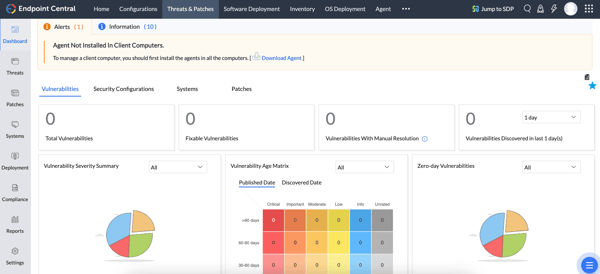
One of many greatest challenges I got here throughout is the restricted assist for Linux and macOS. Whereas Home windows units combine seamlessly, implementing safety insurance policies and making use of updates on Mac and Linux programs requires extra effort. My IT colleagues have talked about that when managing a mixture of working programs, they typically encounter further steps and workarounds to keep up consistency.
As somebody new to the instrument, I additionally seen the steep studying curve. The platform is full of options, which is a giant plus; nevertheless, navigating every thing instantly isn’t at all times intuitive. Establishing insurance policies and dealing with superior configurations takes time, and an preliminary funding is required to get every thing working easily.
What I like about ManageEngine Endpoint Central:
- The automation options make rolling out patches, software program updates, and safety insurance policies simpler with out fixed oversight. As soon as every thing’s arrange, I don’t have to fret about endpoints falling behind on updates.
- The distant management capabilities allow us to troubleshoot and repair endpoint points with out bodily being there, which is a big benefit.
What G2 customers like about ManageEngine Endpoint Central:
“I discover ManageEngine Endpoint Central notably efficient in centralizing software program deployment, patch administration, and distant troubleshooting for Home windows-based programs. The user-friendly interface permits me to shortly navigate by modules, and the dashboard supplies insightful stories on system well being, patch standing, and coverage compliance.”
– ManageEngine Endpoint Central Evaluate, Duy Anh N.
What I dislike about ManageEngine Endpoint Central:
- Managing Mac and Linux units takes extra effort than I anticipated, particularly when making use of patches and implementing safety insurance policies.
- The educational curve was additionally steeper with superior configurations. There’s lots packed into the platform, and it took me a while to determine learn how to use every thing successfully.
What G2 customers dislike about ManageEngine Endpoint Central:
“Typically, the agent is not going to improve some customers’ machines if their machines have been turned off or out of web entry for fairly a while. That is the one concern we have now if the agent improve fails, it turns into tough for us to get them again on the community. It is not quite common, however it nonetheless provides us a tough time when it occurs.”
– ManageEngine Endpoint Central Evaluate, Faisal J.
3. Datto RMM
Protecting observe of a number of endpoints isn’t simple, and Datto RMM takes a number of the load off by automating workflows, tightening safety, and simplifying distant administration. It has its strengths, notably in scripting, integrations, and safety.
With Datto RMM’s scripting capabilities, we might automate duties, run complicated scripts throughout a number of units, and even create scheduled jobs to deal with routine upkeep. It helps PowerShell, Bash, and different scripting languages, giving IT groups flexibility in managing updates, safety configurations, and troubleshooting. What stands out is the power to push scripts remotely, eliminating the necessity for handbook interventions on particular person machines.
Integrations could make or break an IT administration instrument, and I’ve discovered that Datto RMM does a strong job on this space. It connects easily with Autotask, making automated ticket creation and incident response extra environment friendly. The IT Glue integration helps with documentation administration, so there’s much less handbook monitoring of property and configurations. For cloud administration, the Microsoft 365 integration provides visibility into system well being and safety. These integrations assist simplify IT operations, particularly for MSPs juggling a number of shopper environments.
Safety is one other space the place Datto RMM delivers. With multi-factor authentication (MFA), encrypted connections, and role-based entry controls, I perceive why my colleagues belief it for managing delicate endpoints. It additionally helps automated patch administration, serving to groups keep compliant with safety updates with out the effort of handbook installations. Given the rise in cybersecurity threats, having a instrument that enforces strict entry controls and automates safety insurance policies is a main plus.
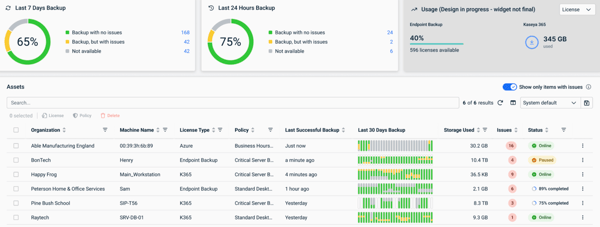
Certainly one of my crew’s greatest frustrations with Datto RMM is the UI transition from the legacy to the brand new interface. Some options from the previous interface haven’t absolutely carried over, which suggests continually switching between the 2 to get issues accomplished. I can see enhancements being made, however the general expertise nonetheless feels a bit disjointed.
Distant entry is one other space that may be hit and miss. Net Distant is a key characteristic, however it doesn’t constantly ship the reliability we anticipated. Connection drops, lag, and instability, particularly on Mac units, are some widespread points. Given how important distant entry is in IT administration, I count on extra consistency.
What I like about Datto RMM:
- The scripting capabilities make automation a lot simpler. We might run PowerShell and Bash scripts throughout a number of units, lowering the necessity for handbook interventions.
- I discover the Autotask and IT Glue integrations actually helpful. Tickets get logged routinely, so we don’t should enter every thing manually, and all of the documentation stays in a single place.
What G2 customers like about Datto RMM:
“I exploit Datto RMM day by day to handle the computer systems in our group. It has all the required options, together with simple software of insurance policies, alert administration, and gadget administration. There are numerous methods to filter units, alerts, and software program, no matter you want! As soon as put in on a tool, Datto RMM collects complete {hardware} and software program data, such because the serial quantity and pc identify. It additionally permits for fast distant entry, enabling me to run PowerShell instructions with out bodily connecting to the laptop computer, browse native recordsdata, run jobs, and set up software program. Moreover, it will possibly learn {hardware} data effectively. Set up and integration are simple, and the client assist is excellent.”
– Datto RMM Evaluate, Claudiu N.
What I dislike about Datto RMM:
- We discovered the UI transition unnecessarily sophisticated. Some options are nonetheless solely accessible within the previous interface, so we needed to hold switching backwards and forwards.
- I additionally bumped into points with Net Distant’s reliability. Connections typically drop, and efficiency might be inconsistent.
What G2 customers dislike about Datto RMM:
“Whereas Datto RMM is extremely highly effective, the consumer interface may gain advantage from a extra streamlined design. Typically, navigating by a number of layers to search out particular options is usually a bit cumbersome, particularly for brand spanking new customers. Moreover, whereas the automation options are sturdy, they arrive with a studying curve that requires time and expertise to grasp absolutely. Some duties, similar to customized report creation or troubleshooting complicated points, may really feel a bit technical for non-advanced customers.”
– Datto RMM Evaluate, Mark R.
4. Atera
Atera is a cloud-based platform created for IT professionals, MSPs, and inside IT groups. It simplifies IT workflows by automating routine upkeep and integrating third-party safety instruments.
Certainly one of Atera’s greatest benefits is its distant entry capabilities. The mixing with Splashtop makes connecting to endpoints seamless, and we will troubleshoot units with none trouble. I respect that the distant entry instruments don’t simply work; they work reliably. This implies much less frustration when attempting to resolve points for inside groups.
One other robust level is monitoring. Atera consolidates endpoint monitoring, ticket administration, and automation in a single place, which saves a ton of time. I can monitor a number of units, arrange alerts for important points, and even automate responses. It’s particularly helpful for IT groups that want to remain forward of potential issues earlier than they escalate.
What actually shocked me, although, is the ease of use. I examined over 20 patch administration options, and a few of them really feel such as you want a PhD simply to navigate the dashboard. Atera’s interface is clear and easy and doesn’t overload you with pointless complexity, even for those who’re new to this sort of software program. It’s very simple to get began.
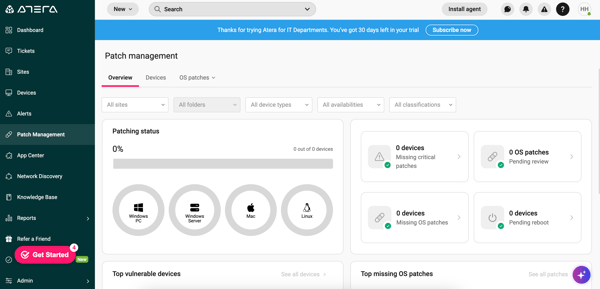
That stated, Atera isn’t good. Efficiency points can typically be an issue. Whereas the platform is generally clean, we did expertise moments the place it felt sluggish, and switching between a number of duties isn’t at all times as quick. It’s not a dealbreaker, however it’s one thing to remember for those who’re anticipating lightning-fast responses on a regular basis.
The cellular app is one other space that would use enchancment. Whereas it’s helpful for fast entry, it doesn’t supply the identical performance because the desktop model. If I simply have to test a ticket or push a fast replace, it does the job. However for extra complicated duties, we normally needed to change again to my pc, which isn’t ultimate.
What I like about Atera:
- We will observe every thing from endpoints to automation workflows, making IT administration way more environment friendly. Establishing alerts and monitoring gadget standing additionally saves us a number of troubleshooting time.
- Atera retains issues easy with out sacrificing performance. I can shortly entry every thing I would like with out digging by limitless menus.
What G2 customers like about Atera:
“Atera is extremely simple to make use of and implement, making it an ideal answer for IT professionals who have to stand up and working shortly. The intuitive interface permits for seamless navigation, and the automation instruments have diminished handbook workload considerably. The AI-driven troubleshooting is a game-changer, serving to us resolve points 70% sooner. The frequency of use is excessive as a result of it combines RMM, PSA, and billing in a single unified platform. The variety of options provided is in depth, from ticketing automation to proactive gadget monitoring, making it an all-in-one answer. Moreover, Atera’s ease of integration with third-party instruments ensures we will join our present programs with out trouble.”
– Atera Evaluate, Alex B.
What I dislike about Atera:
- Navigating the platform might be slower than I would love, particularly when multitasking. I’ve seen occasional lags when switching between dashboards, which might be irritating throughout high-priority duties.
- Whereas the cellular app is helpful for fast duties, I discover that I would like the desktop model for extra complicated duties past the fundamentals.
What G2 customers dislike about Atera:
“Whereas Atera is simple to make use of, there are a couple of options that require extra foresight and setup than I might favor. The search operate is sweet, however not as complete as I would love. I am not at the moment struggling any graphical points however there have been some previously. Pages will not be resizing accurately when not full display, pages are sizing themselves too small, and leaving giant clean areas within the window when scrolling up a web page. Nothing really problematic, however noticeable. Static password and login information administration is sweet, however I’d love an built-in 2FA choice of some sort. I perceive why it is not there, however I might nonetheless like to carry yet another separated a part of my workflow into one place.”
– Atera Evaluate, Luke M.
5. Patch My PC
Patch My PC integrates seamlessly with present infrastructure, simplifying deployment. It reduces IT groups’ handbook duties, together with safety patching, third-party updates, and software program distribution, whereas making certain compliance.
Certainly one of my favourite features is how Patch My PC strengthens safety. It doesn’t simply automate updates; it ensures that each one software program stays updated with the newest safety patches, minimizing vulnerabilities. For firms managing a whole bunch of endpoints, it is a large aid. As a substitute of chasing down outdated functions, the platform handles them routinely, lowering the chance of safety breaches brought on by unpatched software program.
One other space the place it excels is deployment. The platform works hand-in-hand with instruments like Microsoft Intune and SCCM, making it extremely simple to roll out updates throughout a whole group. The flexibleness in customization is a big plus, whether or not we wish silent installs, customized configurations, or pre/post-update scripts, it supplies loads of management with out requiring complicated setup.
After all, patching is on the core of Patch My PC, and it does it exceptionally effectively. The power to automate third-party software patching throughout a number of endpoints is a lifesaver. I notably like the way it centralizes patch administration in a single place, eliminating the necessity for a number of instruments. It additionally ensures that software program stays standardized throughout units, which is essential for sustaining a steady IT atmosphere.
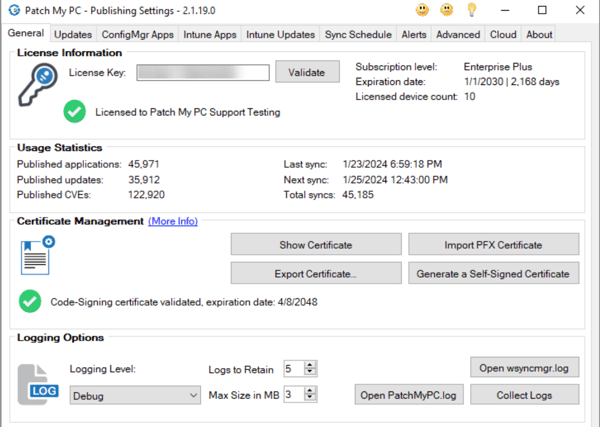
It’s not with out its challenges, although. One subject is lacking functions. Whereas the platform covers an enormous library of software program, I did discover that some area of interest or industry-specific functions aren’t included. Increasing the catalog would make it much more highly effective, particularly for companies counting on specialised instruments.
One other limitation that stood out to me is macOS assist. Whereas the Home windows expertise is clean and well-optimized, macOS feels barely left behind. It’s not a deal-breaker, however it does really feel like a lacking piece in an in any other case strong platform.
What I like about Patch My PC:
- I actually respect how Patch My PC prioritizes safety, routinely patching third-party apps to scale back vulnerabilities.
- It is extremely simple to roll out updates throughout a number of units. I like having the pliability to customise installations with out coping with sophisticated setups.
What G2 customers like about Patch My PC:
“The Intune integration with Patch my computer and the power to make use of both the app or immediately from the net portal make this such a straightforward app to make use of. Within the grand scheme of issues, we’re a small consumer of the supported apps; nevertheless, the power to stand up and working on day 1 or the choice to have guided setup meant we had been up and working virtually instantly. We have already got a small subset of apps routinely deploying at every replace, similar to our confidence in the best way Patch My PC packages the apps. We additionally know that if we have now any points, their customer support crew is there to assist us.”
– Patch My PC Evaluate, Darrell S.
What I dislike about Patch My PC:
- The applying library is lacking some specialised software program, so we nonetheless needed to replace sure instruments manually.
- MacOS assist feels restricted, and managing Apple units isn’t as clean as it’s for Home windows.
What G2 customers dislike about Patch My PC:
“There are a couple of points with the UI that I can see some enhancements. The power to create customized functions is nice, however the itemizing of the distributors for these functions are within the order they’re created and never alphabetical, so it makes it a bit of tough to find them as our catalog of customized functions grows.”
– Patch My PC Evaluate, Craig J.
6. Pink Hat Ansible Automation Platform
Pink Hat Ansible Automation Platform simplifies configuration administration, orchestration, and deployment throughout varied environments with out counting on brokers.
The very first thing I seen was its agentless structure. In contrast to different automation instruments that require putting in brokers on each server, Ansible connects on to programs over SSH or WinRM, lowering complexity and minimizing useful resource overhead. This makes it extremely simple to roll out updates and configurations with out worrying about compatibility points throughout completely different environments.
One other side I respect is how effectively it handles configuration administration. The platform’s use of YAML-based playbooks makes defining automation workflows simple, even for these with out in depth coding expertise. Playbooks are structured, readable, and reusable, permitting for consistency throughout deployments. Plus, the built-in modules cowl many use circumstances, from provisioning servers to managing cloud infrastructure, considerably rushing up the method.
The true energy of Ansible, although, lies in its automation capabilities. It’s not nearly working scripts; it permits full orchestration of IT processes. From dealing with complicated multi-tier functions to automating repetitive administrative duties, Ansible supplies management at scale. The automation controller provides an intuitive interface that makes managing jobs and monitoring execution statuses a lot simpler.
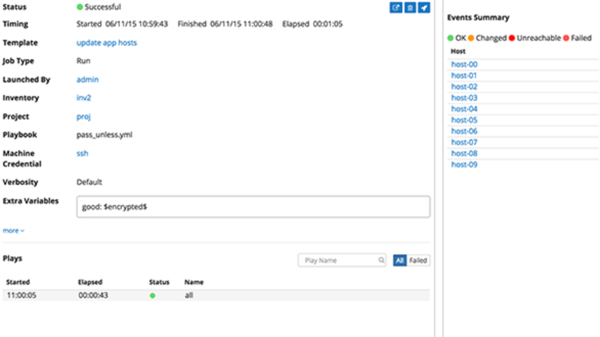
With all its advantages, managing bulk servers might be tedious, as there’s no easy toggle to allow or disable all servers directly. When working with a whole bunch or hundreds of nodes, the dearth of centralized bulk management can gradual issues down, requiring handbook intervention for sure operations.
It additionally has a studying curve, notably with superior playbooks and power integration. I discovered that organising complicated workflows and troubleshooting surprising points might be time-consuming, particularly for groups new to automation.
What I like about Pink Hat Ansible Automation Platform:
- The agentless design means we don’t have to put in extra software program on each server, simplifying deployment and lowering useful resource utilization.
- Configuration administration feels intuitive. We will outline complicated processes in a means that’s simple to learn and modify, making ongoing upkeep a lot smoother.
What G2 customers like about Pink Hat Ansible Automation Platform:
“Pink Hat Ansible Automation Platform supplies a variety of options and integrations which can be essential for day-to-day workflows. Its implementation is less complicated with the information offered.”
– Pink Hat Ansible Automation Platform Evaluate, Srikar V.
What I dislike about Pink Hat Ansible Automation Platform:
- Managing bulk servers was irritating for us as a result of there was no fast approach to allow or disable them .
- I’ve additionally discovered that organising superior automation takes time to grasp. Whereas I might deal with easy duties, troubleshooting complicated workflows requires a deep understanding of Ansible’s modules and syntax.
What G2 customers dislike about Pink Hat Ansible Automation Platform:
“One factor that’s irritating about AAP is the separate logins for Hub and completely different authentication strategies for integrating into Lively Listing. It was a problem to get all of it working and keep working constantly.”
– Pink Hat Ansible Automation Platform Evaluate, Matt M.
7. Acronis Cyber Shield Cloud
Acronis Cyber Shield Cloud blends safety, backup, and catastrophe restoration into one centralized platform, lowering the effort of juggling a number of instruments.
I can not respect the anti-ransomware safety extra. It doesn’t simply retailer copies of knowledge; it actively screens and defends towards ransomware makes an attempt in actual time. We had been notably impressed by the way it detects suspicious exercise and routinely blocks encryption makes an attempt earlier than they’ll trigger injury. For companies coping with delicate information, this sort of proactive safety is a game-changer.
One other standout characteristic is cloud backup and catastrophe restoration. It presents a seamless approach to get better misplaced or corrupted recordsdata, whether or not it’s unintended deletion, a cyberattack, or {hardware} failure. Restoration is clean and dependable. I favored that backups might be saved in a number of areas, together with the Acronis cloud, making certain redundancy. It’s a reassuring safeguard, particularly for firms that want fixed uptime.
Lastly, the central administration ties every thing collectively. The dashboard simplifies safety and backup administration, giving me an summary of all protected units in a single place. As a substitute of leaping between completely different safety and backup monitoring instruments, I might management every thing from a single interface. This streamlined method saves time and ensures no essential safety gaps are neglected.
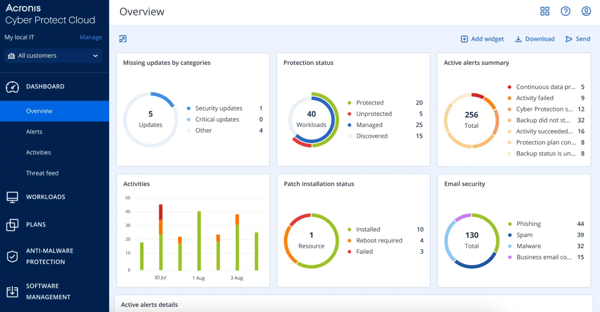
Acronis Cyber Shield Cloud isn’t with out its flaws. The platform often suffers from efficiency lags, which might be irritating when navigating the interface or working backup operations. My IT crew colleagues additionally identified that full backups can’t at all times be deleted independently, creating pointless storage considerations. These aren’t dealbreakers, however they do gradual issues down at occasions.
One other consideration is pricing. Whereas Acronis presents a formidable characteristic set, I felt that it won’t be essentially the most budget-friendly choice, particularly for smaller companies. The fee provides up, notably when scaling throughout a number of units. Nonetheless, if safety and reliability are your prime priorities, the funding might be effectively value it.
What I like about Acronis Cyber Shield Cloud:
- The anti-ransomware safety truly stops assaults, not simply recovers from them. Understanding I don’t should rely solely on backups is good as a result of Acronis prevents issues earlier than they begin.
- Cloud backup and catastrophe restoration make information loss a lot much less scary. Even when one thing goes flawed, I can shortly get my recordsdata again with out scrambling for an answer.
What G2 customers like about Acronis Cyber Shield Cloud:
“In my expertise, Acronis Cyber Shield Cloud has been extremely simple to make use of and integrates effectively with our present programs. I really like the anti-ransomware characteristic. It has given us peace of thoughts understanding that our information is protected. The centralized dashboard can be an enormous plus, because it saves us time by letting us handle backups and safety duties from one place.”
– Acronis Cyber Shield Cloud Evaluate, Javier R.
What I dislike about Acronis Cyber Shield Cloud:
- I seen some lag when navigating or working backups. It doesn’t at all times occur, however it slows issues down when it does.
- I discovered the documentation and assist sources considerably missing. They might be extra complete to assist troubleshoot backup-related points independently.
What G2 customers dislike about Acronis Cyber Shield Cloud:
“Whereas Acronis Cyber Shield Cloud presents a number of advantages, its complexity, potential system efficiency impression, and sometimes inconsistent buyer assist or pricing transparency might be drawbacks for some customers, particularly these with out devoted IT sources.”
– Acronis Cyber Shield Cloud Evaluate, Avishka Ok.
Steadily requested questions on patch administration software program
1. What’s the greatest enterprise patch administration software program?
For enterprises, ManageEngine Endpoint Central and Pink Hat Ansible Automation Platform stand out. ManageEngine Endpoint Central presents in depth automation, multi-OS patching, compliance monitoring, and third-party app updates, making it ultimate for large-scale IT environments. Pink Hat Ansible Automation Platform is ideal for enterprises with Linux-heavy infrastructure, offering agentless automation and seamless integrations with DevOps workflows.
2. What’s the greatest cloud-based patch administration answer?
NinjaOne and Acronis Cyber Shield Cloud are prime selections for cloud-based patch administration. NinjaOne supplies a totally cloud-native, agent-based patching system with real-time monitoring and automation. Acronis Cyber Shield Cloud combines patch administration with cybersecurity, providing automated vulnerability scanning and built-in backup options.
3. What’s the greatest Home windows patch administration software program?
For Home windows environments, Patch My PC and Datto RMM are robust contenders. Patch My PC excels at third-party software patching for Home windows, making it a light-weight but efficient selection. Datto RMM supplies automated Home windows updates, endpoint monitoring, and patch deployment, which is well-suited for IT groups dealing with a number of shoppers.
4. What’s the greatest patch administration software program for small companies?
Small companies profit from Atera and NinjaOne resulting from their ease of use and affordability. Atera presents an all-in-one RMM platform with built-in patch automation, making it accessible for smaller IT groups. NinjaOne supplies a user-friendly interface with automated patching, making it ultimate for companies with out devoted IT workers.
5. Is there any free patch administration software program?
Whereas absolutely free patch administration options are uncommon, most instruments on this listicle supply free trials or demos. This lets you take a look at their options and assess how effectively they suit your wants earlier than committing to a paid plan.
Time to patch up with safety
Protecting programs safe and updated isn’t only a technical necessity; it’s important to working a clean, resilient enterprise. Neglecting patching vulnerabilities opens the door to safety threats, compliance dangers, and surprising disruptions. A dependable patch administration answer eliminates these gaps by automating updates, reinforcing system safety, and making certain your IT atmosphere stays resilient.
With so many choices accessible, one of the best answer is determined by your wants. Some platforms are constructed for big enterprises with complicated infrastructures, whereas others give attention to cloud-based patching or MSP-friendly automation. Whether or not your precedence is seamless third-party app updates, real-time compliance monitoring, or built-in cybersecurity, selecting the best instrument means balancing safety with effectivity.
In an period the place cyber threats evolve quickly, protecting your programs patched is greater than only a greatest apply. I’ve explored these seven instruments so you possibly can keep proactive, cut back dangers earlier than they escalate, and hold your IT infrastructure working. Now, it’s your flip to attempt them out and discover the proper match for your online business.
Safeguard your clients’ most beneficial information with delicate information discovery software program. Learn to use it to adjust to state and federal requirements.


